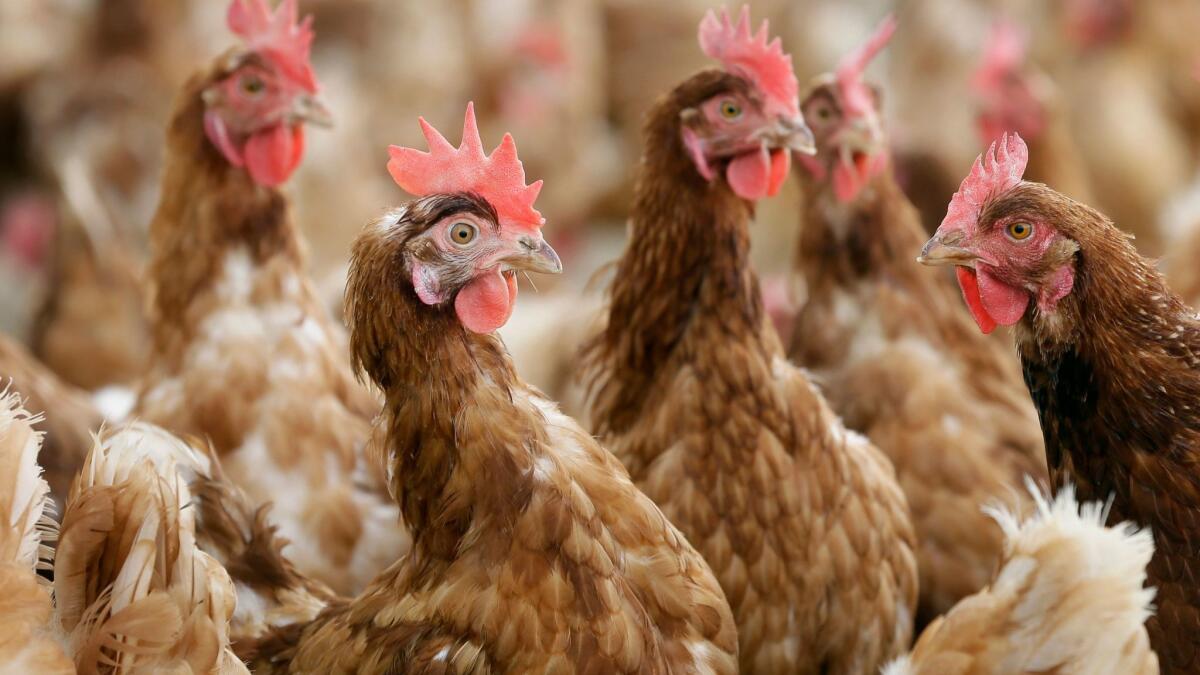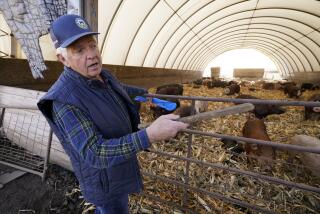Organic egg and meat producers will have to follow stricter animal welfare rules, USDA says

- Share via
Organic meat and egg producers will have to abide by stricter animal welfare standards under a new rule announced Wednesday by the Agriculture Department.
The rule is a victory for animal rights groups two days before President Obama leaves office. The regulations will ensure that organically grown livestock have enough space to lie down, turn around, stand up and fully stretch their limbs. Poultry will have enough room to move freely and spread their wings. Beaks can’t be removed, and cattle’s tails can’t be cut. Living conditions will have to include fresh air, proper ventilation and direct sunlight.
The regulations were first proposed last year. Elanor Starmer, administrator of USDA’s Agricultural Marketing Service, says the rules are designed to help organic producers meet consumer expectations and ensure the integrity of the USDA organic seal as the industry has grown rapidly.
“It ensures that everyone competes on a level field and plays by the same rules,” Starmer said.
Farm-state lawmakers and some farm groups remain opposed to the rules, which they said could raise food prices and force some farmers out of business. Sen. Pat Roberts (R-Kan.), chairman of the Agriculture Committee, said that after President-elect Donald Trump is inaugurated Friday, he would work with Trump’s administration to try to reverse the rules. Trump has yet to name an Agriculture secretary.
“With less than 48 hours left in power, this administration has overstepped its bounds with this damaging rule,” Roberts said.
The rules won’t go into effect until 2018, and some of the changes aren’t required for several years. That could give the next administration time to make changes.
The retail market for organic food products is valued at almost $40 billion in the United States. The USDA said last year that the number of certified organic operations in the United States increased almost 12% between 2014 and 2015, the highest growth rate since 2008 and an increase of nearly 300% since the department began counting operations in 2002.
The broadest proposed changes would cover indoor and outdoor access for poultry, including minimum space requirements. Producers would have to provide birds with daily access to the outdoors, and those areas would have to include vegetation or soil. Enclosed porches would not be considered outdoors.
The USDA removed language from the proposed rule that would have required producers to provide “suitable enrichment” to entice birds to go outside. That proposed requirement was mocked by Republican lawmakers who opposed the regulations — Roberts once joked about yoga and video games for chickens — and drew concern from food-safety advocates who said more outdoors access may increase the chances of salmonella contamination.
The agency said that requirement was removed because it conflicted with Food and Drug Administration rules to prevent salmonella illnesses.
The National Pork Producers Council said the regulations could add complexity to the organic certification process, “creating significant barriers to existing and new organic producers.”
Animal welfare groups cheered the move. Wayne Pacelle of the Humane Society of the United States said the lack of well-defined requirements has led to inconsistency in how organic welfare standards were applied.
“The rule is a game-changer for the $40-billion organic market, whose consumers often believe that organic farm animals are raised with strong animal welfare standards,” Pacelle said.
The Organic Trade Assn. said the vast majority of organic egg producers already follow the standards.
USDA on Wednesday also proposed the first “checkoff” program for the organics industry, which would charge holders of organic certificates a small fee to be used for research, education and promotion.
The USDA oversees many industry-based checkoff programs for commodities such as eggs or almonds, but this would be the first to apply across a broad array agricultural products.
The Organic Trade Assn., which pushed for the program, said the fees — about a tenth of a percent of net sales — could raise as much as $30 million per year.
Although the checkoff is not related to the animal treatment standards, “they’re both indications that the industry is growing and maturing,” said Laura Batcha, chief executive of the trade association.
Fees would be voluntary for growers and producers of organic goods whose sales fall below $250,000 annually, and for those who already pay into other USDA commodity-based checkoffs.
The fee system would be subject to a vote by the more than 19,400 organic certification holders, and governed by an board appointed by USDA.
The Organic Trade Assn. said a survey of about 5,000 certificate holders showed a 2:1 ratio of support.
Times staff writer Geoffrey Mohan contributed to this report.
ALSO
Trump’s pick for Commerce secretary tells lawmakers he’s not anti-trade
American Airlines unveils ‘basic economy’ fare to compete with low-cost carriers
Feds sue nation’s largest student loan servicer, accusing it of cheating borrowers
UPDATES:
3:45 p.m.: This article was updated with information about the checkoff program.
This article was originally published at 12:15 p.m.
More to Read
Inside the business of entertainment
The Wide Shot brings you news, analysis and insights on everything from streaming wars to production — and what it all means for the future.
You may occasionally receive promotional content from the Los Angeles Times.










